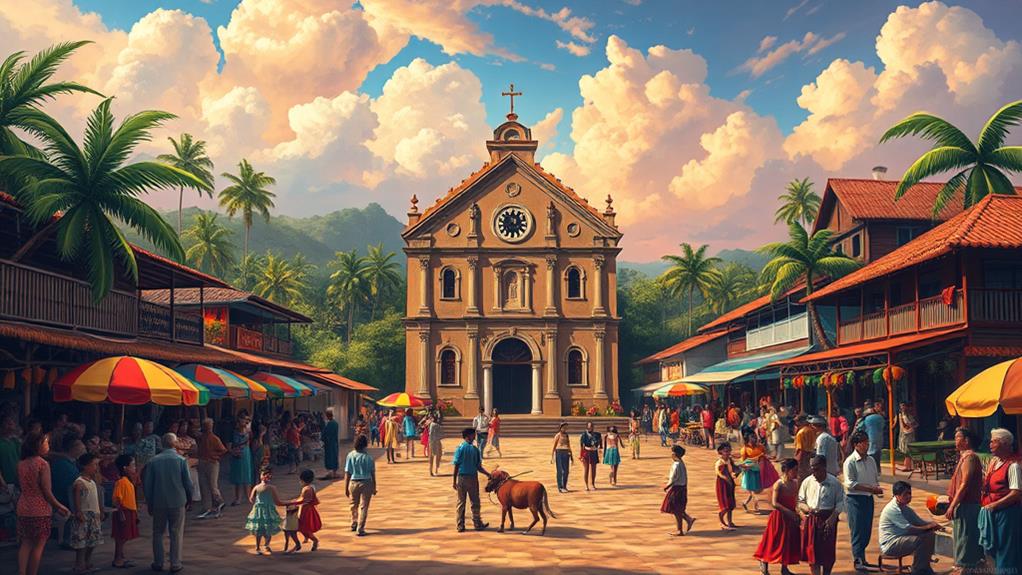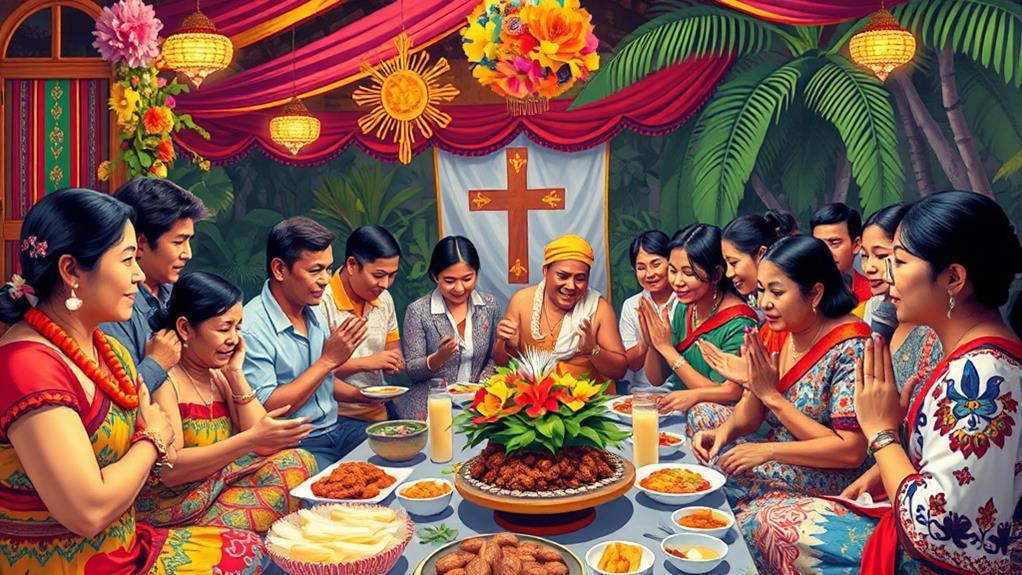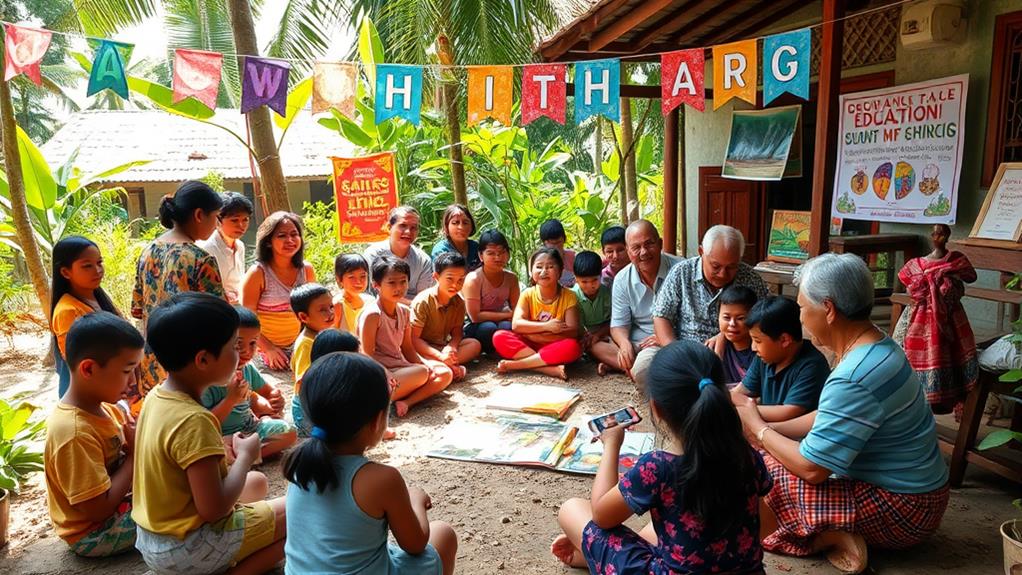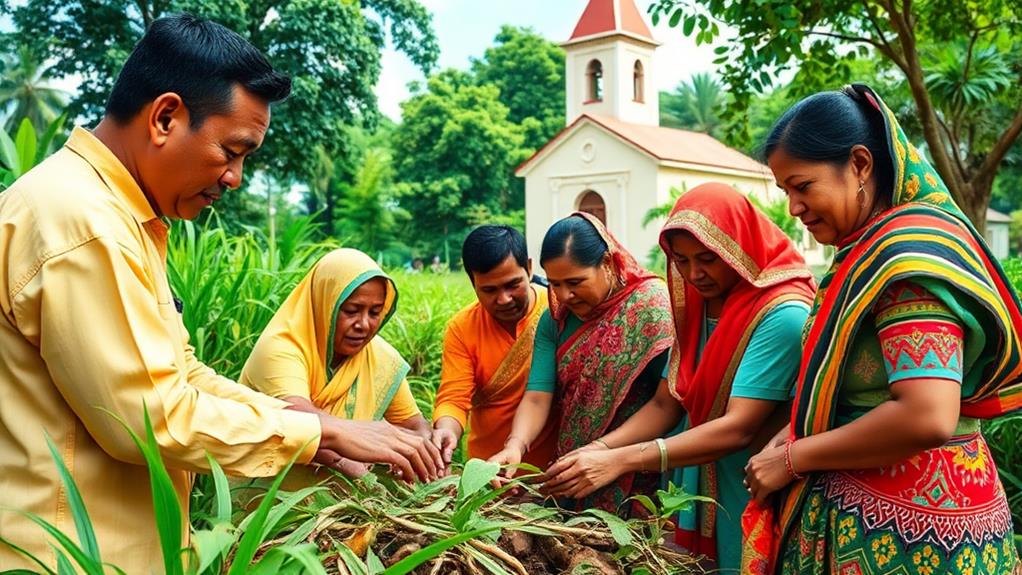Religion plays a crucial role in shaping community development in the Philippines. The Catholic Church, along with various Christian and Indigenous groups, mobilizes resources to combat poverty and support social justice. For instance, faith-based organizations like the Philippine Catholic Church's National Secretariat for Social Action (NASSA) and the Episcopal Church in the Philippines (ECP) provide education and healthcare services to marginalized communities.
Faith-based organizations drive grassroots movements aimed at enhancing education and promoting environmental stewardship. The Tanglaw Edukasyon, a program initiated by the ECP, provides educational assistance to underprivileged children.
Similarly, the Haribon Foundation, a Christian organization, works to protect and conserve the country's forests and natural resources.
The blending of religious values with local traditions fosters collaboration among diverse belief systems. In the Philippines, Catholic and Indigenous communities work together to promote sustainable agriculture and environmental conservation.
This collaborative spirit strengthens community ties and addresses pressing local challenges, such as climate change and food insecurity.
Historical Context of Religion

Religion has significantly shaped Filipino communities throughout history. The introduction of Catholicism during Spanish colonization created a dominant framework that influenced Filipino culture, traditions, and community structures.
For instance, the Catholic Church established a network of schools and universities, promoting education and community engagement.
Islamic beliefs coexisted with pre-Hispanic traditions in certain regions. In regions like Mindanao and Sulu, indigenous religions thrived alongside Islamic beliefs before the introduction of Catholicism. This coexistence highlights the country's rich cultural diversity.
The rise of Protestantism during American colonization introduced new religious dynamics. Protestantism led to the formation of Indigenous Christian churches, which often catered to marginalized groups. These churches provided a spiritual connection that empowered and supported community development.
Religious festivals play a crucial role in community bonding. Catholic traditions have given rise to festivals that serve as social gatherings, strengthening community bonds and local identity.
For example, the Sinulog Festival in Cebu celebrates the country's Catholic heritage while promoting cultural unity.
The interplay of faith and community development defines Filipino society. Through various religious traditions and cultural adaptations, Filipinos have demonstrated resilience and unity in diversity.
This unique blend of faith and community has contributed to the country's rich cultural identity.
Current Religious Landscape
The Religious Landscape of the Philippines
The Philippines is a predominantly Christian nation, with around 92.5% of the population identifying as Christian, mostly Roman Catholic.
Christianity in the Philippines
Approximately 82.9% of Filipinos are Roman Catholic, which has a significant impact on community development and social justice.
There are over 100 active Christian denominations, including Iglesia ni Cristo, which contribute to the nation's diverse religious fabric.
The Catholic Church's Role in Community Development
The Catholic Church plays a crucial role in community development initiatives, mobilizing resources and people for various causes.
Its influence extends beyond spiritual guidance, addressing pressing social issues and promoting social justice.
For example, the Catholic Church leads many grassroots movements for social justice.
The Muslim Population in the Philippines
The Sunni Muslim population constitutes about 5% of the population, primarily in Mindanao.
This minority group enriches discussions on community cohesion and cooperation, contributing to the nation's diverse religious tapestry.
The Impact of Religious Beliefs
Religious beliefs shape not only individual identities but also collective efforts toward community progress.
As a result, understanding the religious landscape of the Philippines is essential for navigating community development initiatives and promoting social justice.
Cultural Syncretism in Beliefs

Cultural Syncretism in the Philippines
Religious Beliefs and Local Traditions Intertwined
In the Philippines, cultural syncretism is evident in the blend of religious beliefs and local traditions, shaping community identity. This phenomenon showcases cultural adaptation and synthesis, where indigenous religious practices merge with Catholicism.
Indigenous Spirits and Catholic Saints
Ancestral spirits, once central to pre-Hispanic worship, continue to be honored alongside Catholic saints, demonstrating the cultural interplay that influences community rituals.
The Catholic Church has allowed local customs to flourish within religious contexts, such as unique devotions to the Virgin Mary during regional celebrations.
Emergence of Indigenous Christian Churches
The Iglesia Filipina Independiente, an Indigenous Christian Church, exemplifies how marginalized groups adapt Christian teachings to resonate with their cultural narratives.
This evolving landscape illustrates growing acceptance of diverse belief systems, with new sects and spiritual movements arising that incorporate elements of Buddhism and indigenous animism.
Understanding Filipino Identity
Recognizing this syncretism deepens our understanding of how faith shapes Filipino identity and fosters a collaborative spirit within communities.
It highlights the importance of cultural adaptation and synthesis in shaping community identity.
Religion's Role in Community Development
Faith plays a vital role in shaping community development in the Philippines. This is evident in the significant influence of religious institutions, particularly the Catholic Church, on social policies.
They guide initiatives to combat poverty and enhance education, emphasizing human rights and social justice to create a framework for sustainable community growth.
Faith-based organizations mobilize resources to tackle pressing issues. For instance, the Catholic Bishops Conference of the Philippines advocates for environmental protection, addressing a critical concern in the country.
Interfaith dialogue promotes collaboration among diverse religious groups. This exchange of ideas leads to grassroots movements arising from faith-inspired initiatives, which address local challenges and promote community development.
Educational Initiatives and Engagement

Educational initiatives in the Philippines bridge faith and community engagement. These initiatives foster a sense of responsibility among students, encouraging them to participate in community development. Catholic schools and universities like Ateneo de Manila and De La Salle emphasize values education and moral education, guiding students toward active community involvement.
These institutions prioritize social activism alongside academic excellence, nurturing students to improve their communities.
Protestant denominations, rooted in American colonial education, promote social responsibility. They establish schools that collaborate with secular organizations, creating programs that address local needs and empower marginalized groups.
Faith-based organizations work with community leaders to implement projects enhancing access to education and resources. For example, they develop initiatives that provide educational materials and infrastructure to underprivileged communities.
Engagement in diverse educational initiatives enriches students' understanding of various religious traditions. Initiatives like the Asia Society Museum's Comparative Hell exhibition provide students with a deeper understanding of different faiths.
Religious institutions in the Philippines shape not just educated individuals but responsible citizens committed to community development. Through a collaborative approach, faith becomes a catalyst for positive change.
Social Justice and Advocacy
Community development efforts in the Philippines are deeply intertwined with social justice and advocacy, where religious institutions take on a pivotal role in addressing societal issues.
The Catholic Church, along with various religious organizations, actively champions social justice. This is often focused on poverty, human rights, and environmental protection through community programs.
For instance, the Catholic Bishops Conference of the Philippines (CBCP) organizes protests against unjust government policies.
Other organizations, such as the National Council of Churches in the Philippines (NCCP), mobilize communities to combat inequality and human rights violations. Additionally, grassroots movements advocate for land rights, particularly for Indigenous peoples and marginalized groups.
Faith-based organizations frequently partner with secular entities, enhancing their impact on development projects.
How does the influence of religion in Filipino identity formation impact community development?
The role of religion in filipino identity is significant in shaping community development. Religion plays a crucial part in Filipino culture, influencing values, traditions, and social interactions. It fosters a strong sense of unity and solidarity within the community, leading to collective action and cooperation in various development initiatives.
Collaboration Between Sectors

Collaboration between religious institutions and secular organizations is essential for effective community development in the Philippines. The Catholic Church, in particular, plays a crucial role in shaping development initiatives, especially in rural areas. By leading projects and engaging with secular entities, the Church mobilizes resources, enhances community engagement, and bridges gaps between different sectors.
The Catholic Church addresses pressing issues like poverty, health, and education through various social action initiatives. These initiatives directly impact millions of Filipinos. For instance, the Church's programs provide access to education and healthcare services, improving the overall well-being of communities.
Interfaith dialogues are vital strategies in promoting peace and development in conflict-affected regions. In Mindanao, interfaith dialogues have encouraged cooperation among diverse groups, fostering a sense of unity and shared purpose. These dialogues have led to the establishment of community-based peacebuilding initiatives, promoting social cohesion and reducing conflict.
Grassroots movements have empowered local communities to advocate for social justice and human rights. By fostering collaboration between religious and secular organizations, these movements enhance community mobilization and influence local governance.
This synergy strengthens development initiatives and promotes a more inclusive approach to addressing complex challenges.
Future Trends in Religion and Development
Religious institutions and secular organizations are collaborating to drive community development in the Philippines. This partnership is leading to inclusive and participatory approaches that cater to local development needs.
Grassroots movements among faith-based organizations are enhancing community engagement. For instance, there's increased collaboration between Muslim Filipinos and Christian denominations, formal partnerships between the government and faith-based organizations, and growth of Indigenous churches promoting social justice narratives.
Additionally, interfaith collaboration is being used for peacebuilding in Mindanao.
Religious leaders will play pivotal roles in sustainable development initiatives. The Philippine government is recognizing the contributions of faith-based organizations, which suggests that policy formulation will increasingly include faith-based perspectives.
Non-Catholic Christian denominations and Indigenous groups will influence community development narratives, leading to more diverse strategies. Ongoing dialogues addressing religious tensions will further necessitate interfaith collaboration, fostering an environment where collective efforts lead to sustainable solutions.
Embracing these trends can empower communities and bolster resilience, ultimately enriching the social fabric and enhancing the quality of life for all Filipinos.
Questions and Answers
Why Is Religion Important to Filipinos?
Religion plays a vital role in shaping Filipino identity and cultural values. It influences the way Filipinos think, feel, and interact with one another. For instance, the predominantly Catholic population in the Philippines is deeply rooted in values such as respect for authority, strong family ties, and a sense of community.
Religion provides moral guidance and support. It helps Filipinos navigate life's challenges, make informed decisions, and develop a sense of right and wrong. For example, the Catholic Church's teachings on forgiveness, compassion, and kindness encourage Filipinos to treat others with respect and empathy.
Religion fosters community bonds and social cohesion. Shared beliefs and values bring people together, creating a sense of belonging and unity among diverse groups. In the Philippines, religious festivals and celebrations, such as the Sinulog and Barrio Fiestas, promote social interaction, cooperation, and mutual support.
Religion inspires charity and a sense of responsibility. Faith-based organizations and initiatives, such as Caritas Philippines and the Philippine Red Cross, encourage Filipinos to support those in need, providing aid and assistance to vulnerable communities.
Religion cultivates spiritual growth and a deeper connection to oneself and others. Engaging in religious practices, such as prayer, meditation, and reflection, helps Filipinos develop a stronger sense of self-awareness, compassion, and empathy, ultimately enriching their community.
What Is the Role of Religion in Community Development?
Religion plays a vital role in community development by fostering faith-based initiatives that enhance community cohesion. It provides a moral framework that encourages volunteer mobilization, helping to address issues like social justice. For instance, many religious organizations have programs that provide food, shelter, and education to marginalized groups.
Religious organizations effectively influence resource allocation, ensuring that marginalized groups receive support. They often have a strong understanding of the local community's needs and can allocate resources accordingly.
For example, a church might use its resources to establish a food bank or a mosque might create a program to provide scholarships to underprivileged students.
Engaging with diverse faiths allows for collaboration, creating a stronger community fabric that addresses both immediate needs and long-term goals. This collaboration can lead to more effective solutions to community problems.
For instance, an interfaith coalition might come together to organize a community clean-up event or a disaster relief effort.
How Does Religion Contribute to the Development of Society?
Religion plays a significant role in societal development by fostering faith-based initiatives that enhance social cohesion and cultural identity.
These initiatives promote unity and a sense of belonging, which is essential for building strong, harmonious communities.
Moral guidance from religious teachings inspires volunteerism, leading to a positive impact on communities. For instance, many religious organizations operate soup kitchens, shelters, and other programs that provide essential services to those in need.
These efforts promote economic empowerment by offering skills training and support to marginalized groups, such as women and minorities.
Faith organizations strengthen community resilience, uniting members to address challenges collaboratively.
In times of crisis, religious groups provide emotional support and material aid, helping communities recover and rebuild.
What Role Does Religion Play in Development of a Country?
Religion plays a vital role in a country's development by promoting social unity and moral guidance.
Religious institutions foster a sense of community, encouraging individuals to work together towards a common goal. Faith-based initiatives drive volunteerism efforts, which strengthen local networks and promote collective action. For example, many religious organizations operate soup kitchens, shelters, and disaster relief programs that bring people together and provide essential services.
Religious leaders also play a crucial role in preserving cultural heritage by guiding individuals towards the appreciation and protection of their cultural identity. This, in turn, enhances community identity and promotes social cohesion. For instance, religious organizations may establish museums, cultural centers, or historical landmarks that celebrate a community's history and traditions.
By collaborating with secular groups, religious institutions address pressing social issues, such as poverty, education, and healthcare. This collaboration contributes to a more unified, compassionate society that supports sustainable development and social justice.
For example, faith-based organizations may partner with non-profit organizations to provide education and job training programs, improving economic opportunities for marginalized communities.